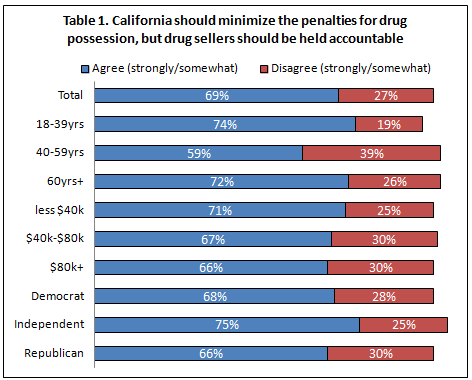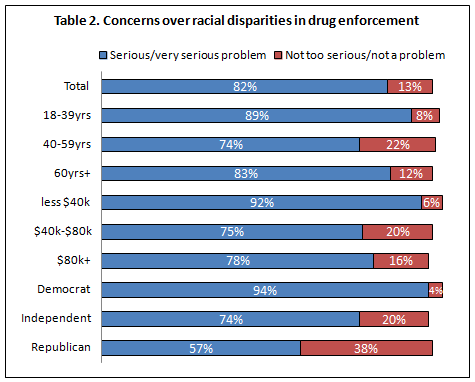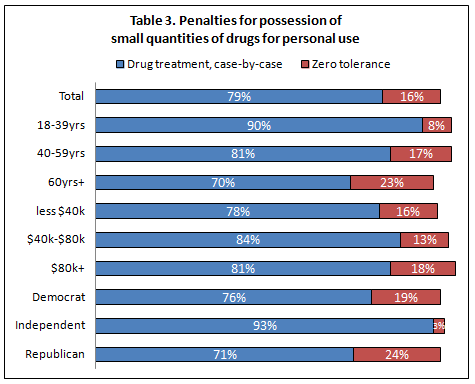The “war on drugs” has dramatically increased our prison population and disproportionately impacted low-income communities of color who are frequently the targets of law-enforcement efforts. The number of persons incarcerated has swelled from 300,000 in 1980 to 1.6 million today. Much of the increase is due to drug-related offenses. According to a 2009 study by the Sentencing Project, two-thirds of people incarcerated for drug offenses in state prisons are African American or Latino, which is out of proportion to the degree that these groups use and sell drugs. On November 5th 1996, California became the first state to challenge our national drug policies by legalizing medical marijuana through Proposition 215. Since then, dozens of U.S. cities and states have followed and broadened California’s example by decriminalizing drug possession and use.
In light of this shift in policies and attitudes toward the war on drugs, where do California Latinos stand on these issues? Specifically, are they supportive of efforts to remove and/or reduce criminal penalties for drug-related offenses? Are racial disparities in drug enforcement and sentencing policies viewed as problematic? In an effort to gauge Latino attitudes, Presente.org collaborated with Latino Decisions on a survey of 400 Latino registered voters in California from March 30 to April 5, 2014. Respondents were interviewed in English or Spanish, at their discretion, by fully bilingual interviewers.

To assess Latino support for increasing or reducing drug penalties for possession, respondents were asked to state their level of agreement or disagreement with the following statement: “California should minimize the penalties for drug possession, but drug sellers should be held accountable.” Table 1 shows that Latinos overwhelmingly support minimizing penalties for simple drug possession; 69% agreed somewhat to strongly, that drug penalties for possession should be reduced. Although support for this proposal was high across all segments of the Latino electorate, we found the strongest support to be among those who are political Independents (75%), 18-39 year olds (74%), and earning less than $40k (71%). Support was lowest among persons who are between the ages of 40 to 59 years (59%).

A number of different studies show racial disparities in arrests and sentencing for drug-related offenses. Do Latinos believe this is a serious problem facing their community? Respondents were presented with the following information, “Even though all racial and ethnic groups use and sell drugs at about the same rate, Latinos are much more likely than whites to be stopped, searched, arrested, convicted and incarcerated for drug law violations. Is that a very serious problem, a serious problem, not too serious a problem, or not a problem at all?” A large majority (82%) said this was a “very serious” and “a serious” problem. Only 13% said this was “not too serious” or “not a problem.” Democrats (94%), persons earning less that $40K per year (92%), and 18 to 39 year olds (89%) demonstrate the highest level of concern. Republicans (57%) displayed the lowest level of concern for such disparities.

Finally, Latinos were asked to state which of the following three penalties should be imposed for possession of small quantities of drugs for personal use: (1) sent to drug treatment centers, not jailed or incarcerated; (2) penalties should be decided on a case-by-case basis; and (3) there should be zero tolerance for all drug crimes, including non-violent small possession offenses. Table 3 shows the percentage of respondents who chose options 1 and 2 (drug treatment/case-by-case) versus option 3 (zero tolerance). The results clearly demonstrate a rejection of the “get tough on drugs” policy approach, where there is zero tolerance for the use and/or possession of illegal drugs. Only 16% of respondents favored the zero-tolerance option. The majority (79%) favored an approach that emphasizes treatment or introduces flexibility in the sentencing process. The highest level of opposition for the zero tolerance option came from younger Latinos (18-39 year olds) and political Independents. Not surprisingly, the zero tolerance approach had its greatest support among the most conservative segments of the Latino population, those who are 60 years or older (23%) and Republican (24%). Nonetheless, these same segments support for drug treatment and flexibility in the sentencing process by 70% or more.
Latinos and African Americans are disproportionate casualties of the war on drugs; prisons are overflowing with minorities who have been convicted for drug law violations. The consequences of drug arrests extend beyond those convicted to include their families and communities. It comes as no surprise that Latinos in our survey are saying “no mas” to the traditional war on drugs. However, it’s younger and low-income Latinos, those who are most likely to be the victims of the war on drugs that are most supportive of decriminalization. Latino attitudes toward the decriminalization of drug use and possession mirror those of the general population. Last year the Pew Research Center found that the first time in four decades of polling, most Americans favor legalizing marijuana. In our survey, 71% of Latinos agree that medicinal marijuana is an important medicine for people with serious illnesses and should remain legal. Whether these attitudinal trends continue to rise or plateau is an open question. What is clear from our survey is that California laws that decriminalize drug possession will receive enthusiastic support from the Latino electorate.
Adrian Pantoja is professor of political studies at Pitzer College, and a senior analyst at Latino Decisions.


